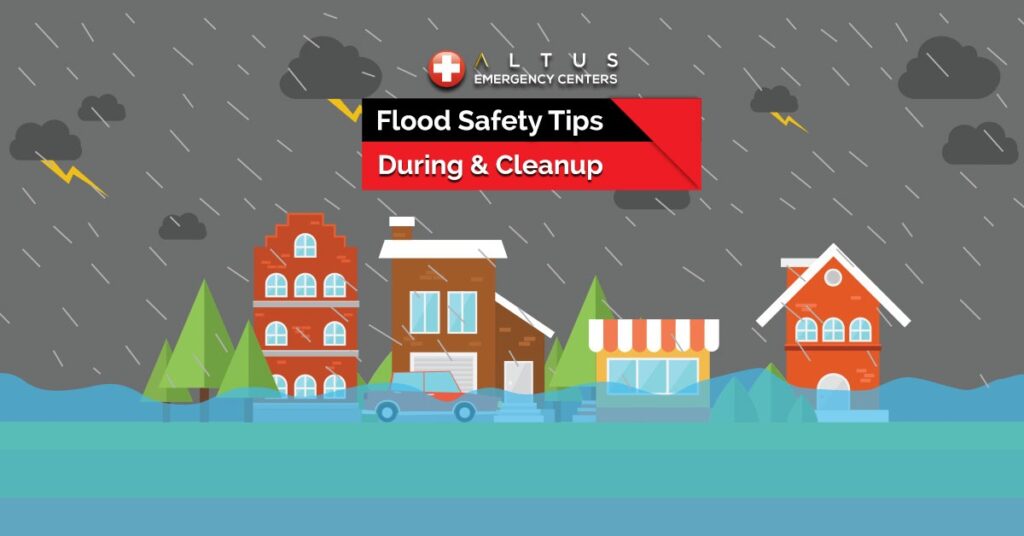[vc_row][vc_column][vc_column_text]
Flood Safety Tips. Protect Yourself During and After a Flood.
Water is a source of life; however, during a flood that same water can be deadly. According to the CDC’s website, more deaths occur due to flooding than any other storm-related hazard.
Mother nature is unpredictable, but there are ways to protect yourself and those you love during a flood.[/vc_column_text][us_image image=”23703″ size=”full”][vc_column_text]
What to Do During a Flood?
The real danger starts once the floodwaters have risen. To protect yourself, please remember:
- Not to drive through flooded areas or standing water. You don’t know how deep the water is and it’s important to realize you could lose control of your vehicle in as little as 6-inches of water
- Don’t use flood water for bathing, brushing your teeth, washing or prepare foods, or wash dishes. Under no circumstance should drink flood water as it is most likely contaminated
- Only drink water from the faucet after your local authorities have said it is safe to drink.
- During a water advisory, you should only drink bottled. For cooking only use bottled, boiled, or treated water
- If any of your food supplies come in contact with floodwaters, don’t eat them
- If you are using a generator, make sure to place them at least 20-feet from any windows, doors, or vents to prevent accidental carbon monoxide poisoning
[/vc_column_text][us_image image=”23704″ size=”full”][vc_column_text]
Flood Cleanup Tips
The cleanup process is perhaps where most flood-related injuries and illnesses occur. Infectious organisms might have contaminated floodwaters. The most common microorganisms found in standing floodwaters are:
- coli
- Salmonella
- Shigella
- Hepatitis A virus
- Agents of typhoid
- Paratyphoid
- Tetanus
Floodwaters could also be contaminated by hazardous agricultural, industrial, or petrochemical components.
To help keep you safe, the staff of Altus Emergency Centers in Lumberton has several health-related tips to share with you:[/vc_column_text][us_image image=”23700″ size=”full”][us_separator size=”small”][us_cta title=”Know Where to Go in Case of an Emergency.” btn_label=”FIND AN ER” btn_link=”url:https%3A%2F%2Faltusemergency.com%2Ffind-an-emergency-room-near-me-find-an-er%2F”][/us_cta][vc_column_text]
Keep Children Safe
During the cleanup process, keep a close eye on your kids.
- Don’t let them play in or near floodwater
- Make sure they wash their hands often or at the very least before each meal
- Disinfect toys by soaking them in a solution made from 2-ounces of bleach per 1-gallon of water, let toys air dry after you have disinfected them
- Throw away any stuffed or soft toys that may have been contaminated by the floodwaters
[/vc_column_text][us_image image=”23705″ size=”full”][vc_column_text]
Food Safety
If you have power or are using a generator to power your appliances, then keep your refrigerator as close to 41°F as possible. If your electricity is out, you should know that your refrigerator will only keep your food cold for four or six hours if left unopened.
Additionally:
- Without power, your freezer will keep your food frozen for one day or two days maximum if left unopened
- Canned foods are safe to eat. However, you should remove the labels and wash the sealed cans with either warm water and detergent or a mixture made from 1-tablespoon of bleach per 1-gallon of water. You can relabel the cans after washing them
- Throw away any canned food if you notice the can is rusted, pitted, bulging, or leaking
- Wash your Tupperware and other kitchen items in a solution of bleach and water to disinfect them
- Throw away any food that might have come in contact with floodwater unless it comes in a sealed can
[/vc_column_text][us_image image=”23699″ size=”full”][vc_column_text]
Water Safety
- Follow the guidelines issue by local authorities concerning the use of tap water
- Boil water for at least one minute to kill any bacteria
- You can disinfect water by adding 1/8 of unscented household bleach to one gallon of water. You will need to let it rest for at least 30 minutes before you can use it
- You can also add purifying-tablets to water instead of boiling or disinfecting it
- If you have infants, don’t feed them formula made with treated water. Try using canned baby formula instead
[/vc_column_text][us_image image=”23698″ size=”full”][vc_column_text]
Beware of Mold
- Protect yourself from mold by wearing a face mask whenever you are cleaning an area where mold has grown
- Open windows and doors or use fans to let the air help dry out your home or office. You should try to have all the surfaces cleaned within 24 to 48 hours to prevent mold from growing
- If you encounter mold in your home, try cleaning it with a mixture of 1 cup of bleach per 1-gallon of water.
- You should always wear gloves when cleaning moldy areas or working with bleach
[/vc_column_text][us_image image=”23702″ size=”full”][vc_column_text]
Protect Yourself from Tetanus
Tetanus can enter the bloodstream through an open wound, even small ones. Tetanus can cause a condition known as lockjaw. This condition causes painful muscle tightening. When it attacks the jaw muscles, you won’t be able to open your mouth or swallow.
If you experience lockjaw, you should come to the Altus Emergency Center in Lumberton as soon as possible.
Treating Wounds
If you cut yourself while cleaning up after a flood, you need to wash the wound with soap and clean water thoroughly. Apply an antibiotic cream to the injury.
If you have not had a tetanus shot in the last ten years, you will need to get one. Additionally, if your wound is deep, severe, or becomes infected, you need to seek immediate medical attention.[/vc_column_text][us_image image=”23701″ size=”full”][/vc_column][/vc_row]

